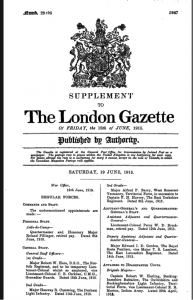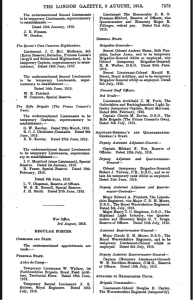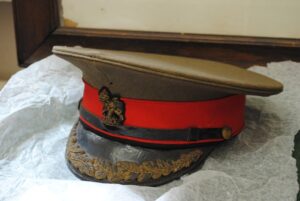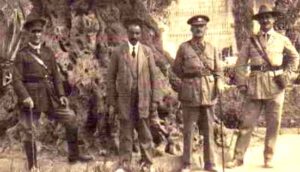Major Pillinger and the Great War
Researching the role my Grandfather took in the Great War is still an on-going project.
Going back to 1913, Major Pillinger was obliged to retire from the Tenth (PWO) Royal Hussars in May of that year, after the Regiment had been in South Africa for a little over twelve months, under the “Time Expired” rules of the military, having served 35 years. The Regiment, having moved from India to Bloemfontein in 1912, had now moved on to Potchefstroom. A letter published in the XRH Gazette of October 1913 from Major Pillinger, now in civi- street reads:
Dear Sirs
For the first time I appear as a correspondent of the Gazette, and do so with somewhat dubious assurance. The question occurs – can this pen, which has now alas, no place on the table where it reposed for so long, and where it could note and comment upon those incidents which made, or are making the Regiment’s history – find topics which will interest your readers. Hitherto the pen in question has written in the arrogant first person, plural, which style often without reason, demands, if it does not command, attention. Herefrom, the humble and objectionable Ergo must replace the regal We, and the hope is now expressed that you will give the writer credit for his attempts to eliminate it from his communications when to him practicable.
The first subject chosen is purely a personal one, addressed to every Officer, N. C. Officer and man of the Regiment, for which no better term suggests itself than:
A RETROSPECT
I wonder, had I been the most self- analytical of men, whether it would be possible to convey to you, in cold words, the feelings that possessed me on the night of Wednesday the 28th May when it was my lot, the saddest of all lots, to have to say “Goodbye” at what was announced in the programme as “A Farewell Bonfire Concert for Major Pillinger”.
Subjugating all other sensations was one of intense gratitude to all who were present on the occasion, who by their attendance inspired the conviction that their esteem and good wishes would follow me in my exile from the Regiment. Sitting here, in far-away Cairo, it is my ardent wish to assure all my old comrades of all ranks, that my intensity of thanks has not, and will not diminish; that the scene of that concert between the Officers’ and Sergeants’ messes, will never fade from my happy recollections. Happy because it formed the best and most consolatory antidote in an episode which was otherwise lamentable.
My thanks are now repeated to Colonel Barnes, my Commanding Officer; to Captain Peto who directed the admirable and talented concert party; to my comrades who formed the party; to the clever, if small, band who helped so largely to make the concert the success it was, and to every Officer and man who made my life so pleasant during my service, and my departure from amongst them a memory which will ever be recalled with pride.
Never can the last day with you all be forgotten; I recall, with mingled feelings, how the little band, (as band) turned out and played that saddest of all airs “Auld Lang Syne”, how my old comrades awaited my passage past their lines and showed their farewell good wishes’ and how ever Officer and some of my friends the N. C. Officers and men appeared at Potchefstroom railway station to say personally their last goodbyes. The train, as so frequently happens on such occasions, was inopportunely late enhancing the trials of parting, but at last it appeared, the last hand-shake was accomplished, and it was only left to brood moodily in the knowledge that my final severance with the Regiment had been consummated. That appeared the end of all things as far as I was concerned as a Tenth Hussar. Now the title I must assign to myself is that of an “Old Comrade”, and great consolation is derived from the knowledge that the next best thing to being an active Hussar is the claim of being an “X.R.H. Old Comrade”. In that role it is my hope that meetings with very many comrades will be possible in the comparatively near future.
I must admit to write a farewell to my old friends, Mr Atherley and the band, who were fulfilling an engagement at Johannesburg, when I left. It is my prideful reflection that between myself and the members of the band, the most cordial relations existed, and many thanks are given to those who rendered me so much assistance, by their contributions to the Gazette. Amongst these Corporal Mitchell, when in charge of the hot-weather band at Pindi, was prominent.
In conclusion, accept this assurance that the warmth of my feelings for the Regiment, and all connected with it, will be retained at a temperature even higher than that of the concert bonfire, which was so skilfully constructed by Sergt. O’Connell and his skilful Pioneers, and which compelled the withdrawal to remote distances from it, of the audience who occupied the seats around it.
R. PILLINGER
Some time shortly after the concert, a fellow Officer, Pat Armstrong, wrote home to his mother in Ireland:
“We had a most painful day yesterday. Poor little Major Pillinger commonly known as Pilse our Quarter-Master who has been in the Regt 35 years became time expired & had to leave. It really was awfully sad as he is an absolute topper. We had a great farewell concert to him on Thursday night & then his farewell dinner on Friday & the poor little man went off yesterday afternoon. He was dreadfully upset & almost in tears but he’s a real good plucked in & stood it manfully. I don’t know what we will do without him we will miss him most awfully.”
This letter was sent to me, from the archives at the University of Limerick, by archivist Anna-Maria Hajba, at the Glucksman Library, who came across it whilst establishing a website longwaytotipperary.ul.ie detailing the lives of the Armstrong family during the Great War. I am indebted to Anna-Maria. For more go to Armstrong Papers, P6/1210 (187)
On Tuesday June 3rd, 1913, a dinner of the 10th (P.W.O.) Royal Hussars Old Comrades Association was held at the Holborn Restaurant, where the toast to the Old Tenth was proposed by Major W.C.Cadogan. In his speech he said, after listing some exceptional non-commissioned Officers who had left the Regiment during past twelve months, “.. experience teaches however good a man is at his job, we always find someone to take his place. But there is one who is on the sea at the present moment coming home who is indeed difficult to replace. The Officer I refer to is Major Pillinger. It is almost impossible to realize what he has been to the Regiment all through the years. Of course you know what he was in India and Africa, and what he was to you at home. I cannot imagine what the mess will be like without Major Pillinger. “
In January 1914, and extract from a letter Major Pillinger wrote to the Editor of the Gazette from Cairo was published in the magazine. He wrote:
“Very soon after arriving, with a couple of Old Comrades, the acquisition of information respecting others ensued.” He then goes on to list the lives of several Old Comrades.
Later in 1914, in the Gazette of July of that year, there appears a fulsome report of the proceedings of the Annual Gathering and Dinner of the Tenth (PWO) Royal Hussars Old Comrades Association, held at the Holborn Restaurant, on Tuesday May 14th 1914. Major Pillinger was back home and appears as a Guest:
The Editor goes on to list the Officers who attended as:
Major-General Viscount Downe K.C.V.O., C.B., C.I.E., PRESIDING
Present were: Major-Generals Sir J.P.Brabazon K.C.B., C.V.O., Combe C.B.,
Colonels Alexander D.S.O., Baird, Fisher-Childe, C.B., Hon J Napier, St Quinton, Spottiswood, Viscount Valentia C.B., M.V.O., M.P., Vaughan D.S.O., Wilson D.S.O.,
Majors Barry D.S.O., Lord Bellew, Hon. W.G Cadogan M.V.O., Crichton, Viscount Hampden, Hughes-Onslow, Sir J Milbanke, V.C., Pillinger, Poole, Waite, Sir M. Wilson, Bart., C.S.I. M.P.,
Captains de Tuyll, Gibbs, Greenwood, Hon G Portman, Lord G Scott, Grenfell, Earl of Gainsborough, Earl of Mayo, Lord Southampton, Sir W Bass, Bart., Hon. D. Pelham, Messrs. Dorrien-Smith, Chaplin, Bouch and Potter.
A telegram from the King was read at the dinner as follows:
“… will you convey my thanks to all members of the Old Comrades Association assembled, for their good wishes and loyal assurance.”
GEORGE R.I. Colonel-in-Chief.
After the dinner Major Crichton proposed the toast to the “Old Tenth” and Major Pillinger was called upon to reply.
The next time Major Pillinger appears is in a letter again found in the Armstrong papers at the University of Limerick and kindly sent to me by
Anna-Maria Hajba. This was dated 12th March 1915: (It should be noted that all Officers and most men where known by a nick-name)“My dear Pat. The sending of a card at Xmas was a very small matter compared with your letter, written so long ago as the 7th [?] Jan: its receipt was an unspeakable pleasure to me. The delay in acknowledgment arose from my absence from Cairo. I’ve been doing a bit of campaigning – a very modest bit you will say when you hear all about it. Despairing of getting a job at the front, I attempted to secure one with the Flying Corps here, as an observer, and failed on a/c of my ignorance of Arabic – (are you surprised to hear that my French, which was also a condition, was accepted without question?). then, hearing of the contemplated formation of a Camel Corps, I fired in another application, and was at once taken on. We were ordered to join within 24 hours, and off I went, mobilised at a place called Abu Sueir, 1400 camels, 800 Arabs, with an Indian NI [?] Regt of Imperial Service Troops as escort. It was an Alwar Regt, the most moderate unit I ever struck. Here my Hindustani came in useful, resulting in my appointment as Provost Marshal Interpreter and General utility man. We never came under actual fire – were at Nefise, not far from the scene of the fight, on morning of 3rd. The poor show of the Turks convinced the Govt that the maintenance of the Corps at its full strength was unnecessary, so it is reduced to 500 camels and a small personnel which does not justify my inclusion. We finally found ourselves at Ismailia, whence I returned here on Monday. In the meantime the Committee had determined that it is not in the interests of the Club to retain and [sic] Asst Sec, and pay him for doing nothing, consequently the present holder is given ye order of ye boot. The Secretary-ship of a club at Alexandria is becoming vacant and my application for that went in. There were legions of local applicants which were reduced to three of whom I was one, but the Committee of that Club, I learnt yesterday, have decided to defer the final selection, pending results of advts in “The Times” and other English papers; not being over-keen to stay in Egypt I shall not await further developments. Also I can, if I feel inclined, take over a job as Censor here, at the end of the month, but it does not appeal to me, so I’ve determined to return to England and take my chance of getting some sort of job with the Army there. It is the only thing in which my heart is. Probably I shall leave here on or about the 5th April, by a Bibling [?] boat, and my address will henceforth be the “Junior Army & Navy Club, Whitehall”. You will have had eno’ of me and my affairs so to other matters. In the papers which arrived by yesterday’s mail is to be read Giblet’s gazette as Major, Shaver as Lt Col, and tilgai [?] retaken on from the supernumerary list. I am wondering if he has rejoined: the last letter I had from him was written from Russia: he was serving with the Russian army, and very pleased with everything. Webb, the Vet of Pindi days was in the Club on Wednesday, going thro’ from the Sudan to Alexandria, he told me Giblet is engaged to be married, to a lady of the same name. I have not seen it in any paper. I owe him a letter too, and must write today. All the dear lads are so good in writing to me. Their letters are so welcome, and so looked for. I am so glad you are having such valuable and I take it, enjoyable experience on the staff. How I long for meetings with you all, to hear from your lips, the things that you have done and seen, I pray you may never have such terrible times as the retreat furnished; it seems to me a pity that you are not all with the Regiment, which is certainly the most desirable thing in life. Clem, & Billy & Giblet are very sick because they are detained in England. What a pity it is that dear old Narcisse had to go home: it was good to see his name in despatches. How splendidly all Tenths have done. I’ve not heard a word of or from Brock, and wonder how he is getting on. Jon Vaughan is a C.B: Bungo a KCMG, and Hans [?] a Major Gen – all for good service in the field: each will, I’m sure, be accorded further honours before everything is finished. They are a trio impossible to beat. As you say, it is dreadful to reflect upon the terrible loss we’ve sustained – Pic, Willie, Rosie, Rabbit, Foureyes, Bob Drake – search the world o’er and you will not find more gallant soldiers, more lovable friends: always I am very sad when I think of them. The regiment will never be the same again. Luckily we have some very good boys coming on, by all accounts; they will no doubt live up to the old traditions and prove as good as their predecessors, but to an old “has-been” like me, that knowledge is poor comfort for the loss of the dear, kind comrades of so many years. Be sure Pat that my thoughts are ever with you, that my constant wish is, that you may come out of this terrible war safely: almost I am reduced to hoping that the Cavalry may not again be exposed to danger – but not quite – I want the Regiment to earn every glory which the war can yield. How I wish I were with it. Much love to you, dear Pat. Yours ever Pilse”
Please see Armstrong Papers, P6/1398A (1)
On 6 October 1915, Pat (Armstrong) notes in a letter to his mother:
“… they are starting a field force canteen here in a few days (about time too) & we ought to be able to get anything we want there. I hear that little Pilse is going to run it, so he’ll get me all I want.” On 9 October he repeats the news: “We ought to be well of [sic] now for stores as they are going to open the field force canteen on Monday on the beach. One can buy practically anything there I hear. It will be a great affair if they don’t sell out in the first week like they did with the place they opened at Helles. I hear that little Pilse is running it so I expect it will be well done. It will be a great blessing to the men. They say that there is 20 thousand pounds worth of stuff there.”
And on Tuesday 16 November Pilse writes to Pat from Kefalos:
“My dear Pat. Your letter of 30th Oct was received, on my return from Mudros, yesterday week: on Wednesday I went, hot foot, to Suvla, only to find that you had “cleared”. I was very disappointed. But I ought not to be since the cause was your advancement to staff captain, you know how proud I felt on hearing that. I’ve been trying to see you this many a day. Last August we only just missed each other at Helles: I was there and was told by Jimmie Watson that you had left “about an hour ago” He saw you taking ship. I was there for ten days and you shot off on the third of them. I am not quite sure whether you are with the 87th or the 88th Bde: think the latter so address this accordingly. I’ve seen everyone except Long Un and Dofus. The latter wrote me the other day, from Anzac where he is adjutant of the Welsh Horse. I must try to get to him ere long. I am sorry to hear of the introduction of a KOG to command as I’m sure Giblet would do better with the Regiment than a stranger. We’ve tons of milk, but suppose you are not catering now. Do let me know if you want anything we have, and rely you will get it. Love to you Pat – and hope to see you soon. I am off to Suvla again, tomorrow. Yours ever, Pilse”
Please see Armstrong Papers, P6/1398A (2)
Major Pillinger is also mentioned in the following announcements in the London Gazette of June and August 1915. (Reference www.thelondongazette.co.uk)

 Whilst I have been unable to confirm this yet, it would seem very likely that Major Pillinger had joined the 29th Division of the Army Service Corps.
Whilst I have been unable to confirm this yet, it would seem very likely that Major Pillinger had joined the 29th Division of the Army Service Corps.
To quote from the website of the Long, Long Trail, The British Army in the Great War,
“The 29th Division embarked at Avonmouth and went via Malta to Alexandria. On the 7th April 1915 On the 7th April the first units to arrive in Egypt bena ro re-embarked for the move to Mudros, the deepwater harbour at the island of Imbros that was going to be used as a forward base for the operations at Gallipoli. The Division landed at Capes Helles on Gallipoli on the 25th April 1915…..”
On the nights 7th/8th January 1916 the Division was evacuated from Gallipoli and all units returned to Egypt. Orders were received there on the 25th February for a move to France.
There is however no evidence that Major Pillinger accompanied the Division back to France, and it would appear that he left the ASC and remained in the Middle East.
I also have no information about his appointment as ADC, as reported in the London Gazette.
I have recently had a closer look at the cap Major Pillinger was photographed wearing, which is part of the collection at the Horsepower Museum in Winchester, UK. which is captioned as having been taken in the Garden of Gethsemane in Jerusalem in 1917, with General Allenby.

This cap would have been worn by a Lieutenant-General or General, and given that Roland served on the Staff in the Middle East it is very possible that he was temporarily promoted to one of these ranks for the fight in Palestine.

This therefore leaves much further room for more research once the Covid restrictions allow me more access to the records at Kew.
Copyright 2019 © Major Pillinger/Richard Pillinger. Unauthorized use and/or duplication of this material without express and written permission is strictly prohibited. www.sciweb.co.uk